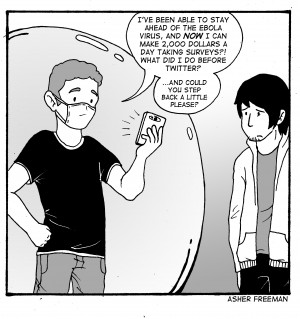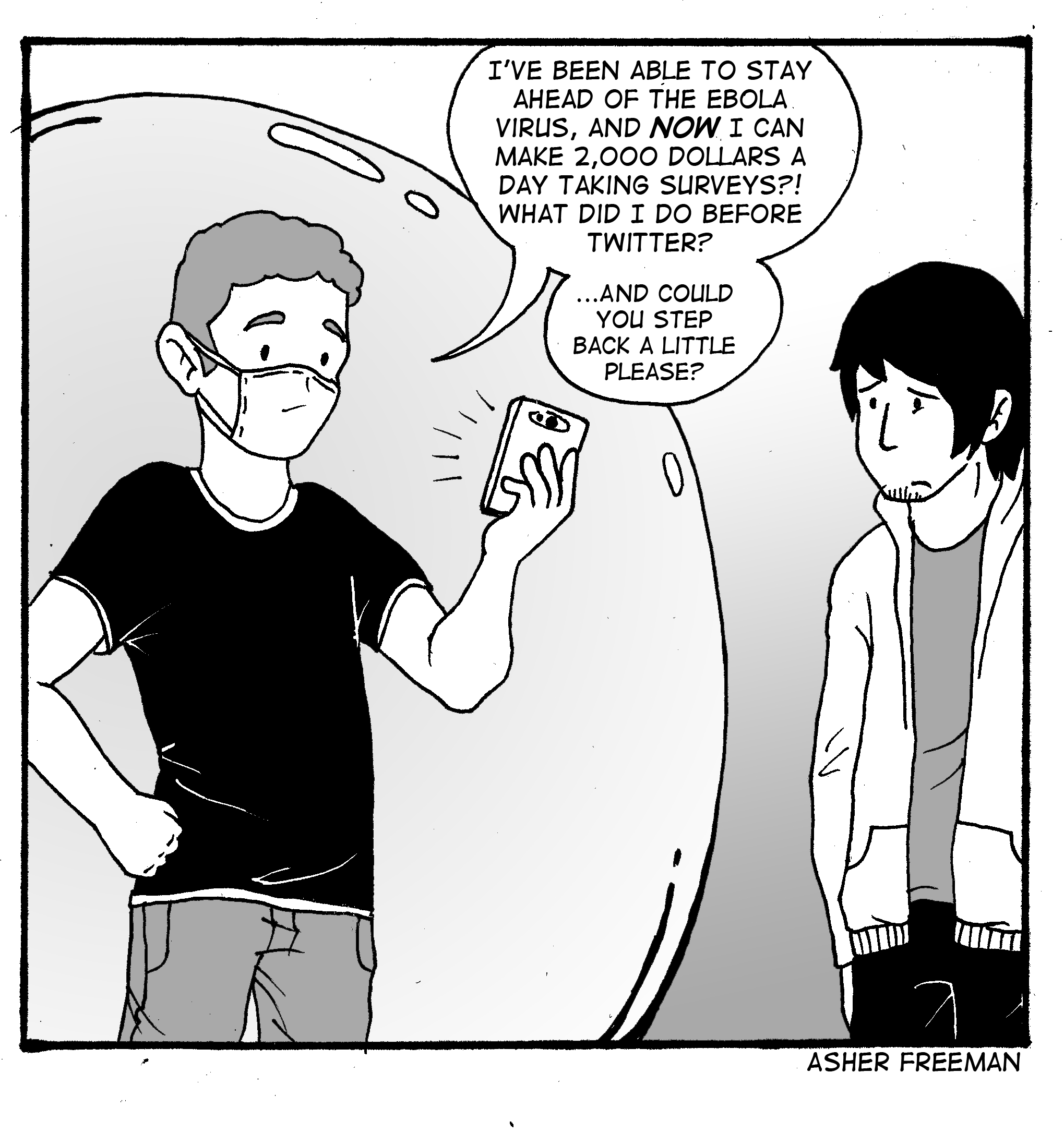 Media coverage and talk of Ebola’s threat are spreading around the globe faster than the actual virus. But the messages arriving on people’s social media feeds and what is actually happening aren’t completely aligned.
Media coverage and talk of Ebola’s threat are spreading around the globe faster than the actual virus. But the messages arriving on people’s social media feeds and what is actually happening aren’t completely aligned.
This issue of perspective became especially alarming after the first person diagnosed with the virus in America did not survive. His death has sparked real fear in people that is only worsened by poor choices people are making in regard to the information they choose to spread.
Because there isn’t a filter system in cyberspace that separates jokes about Ebola from actual information, or news from gossip, people are left to make up their own minds about which information should be dismissed and when to hit the “retweet” button.
This situation is only made worse when verified media outlets become part of the fear problem. On sites such as Twitter where there is a character limit, news outlets will sometimes pull a quote they hope will draw readers in, but, not everyone will click the link that leads to the full story. A partial quote, such as the one by @NBCNews, which reads “CDC director on Ebola: ‘The only thing like this has been AIDS,’” can be misleading.
For those who never click the link in the tweet, all that has registered is Ebola is as bad as AIDS. But what does that mean? Does Dr. Tom Frieden, the director of the Centers for Disease Control and Prevention, mean the virus is similar in its genetic makeup or that as many people have died from Ebola as people from AIDS?
He meant neither. What he meant and what he explained further was that the virus originated in Africa, like AIDS, and if people who show signs are not treated properly, the Ebola virus has the potential to spread in a similar fashion.
That is not as alarming because when the information is analyzed as a whole, it’s purely a scientific explanation of the virus. However, this small quote alone doesn’t paint an accurate picture.
According the World Health Organization, this largest outbreak of Ebola in history has claimed the lives of 3,800 people. That includes people from Guinea, Liberia, Nigeria, Senegal, Sierra Leone and the United States.
AIDS killed more than 1.6 million in 2012 alone while another 35.3 million continued to live with the disease around the world. AIDS and Ebola are not yet equatable.
It could be argued that the responsibility falls on followers of @NBCNews to click the link, read the information in detail and then compare it to other information. But it’s Twitter, not a classroom. The burden here falls on the media outlet to select facts that aren’t has easily distorted so that people who only glance at their feed won’t walk away with the impression that AIDS and Ebola are one and the same.
And if a news outlet like NBC can tweet in a way that confuses or misinforms, than the potential for individuals to disseminate things that are misleading, unnecessarily scary or downright wrong is also a possibility.
A tweet by @Back_Tabak said, “Ebola’s spread out of Dallas, next big city from Dallas is Waco. Baylor is in Waco. So now will be a good time to say something before I die.”
It is well known that social media is a place where people tend to make light of serious situations, perhaps as a way to deal with them, but outright lies and joking are different. And because tweets don’t have inflections at the end or laughter to follow, the way a joke might in a natural conversation, something like this could be taken seriously by someone who doesn’t understand the humor in making fun of a deadly virus.
But the hope that exists for people searching for information on Twitter are accounts like @WHO, managed by WHO, a specialized agency part of the United Nations concerned with international public health.
WHO is focused on disseminating factual information that can help people stay informed and prepared, which isn’t to say they are masking the problem, but they also aren’t delivering half the information.
One tweet by WHO read, “‘Energy needs to be focused on swiftly addressing the real needs and gaps in communities in West Africa affected by #Ebola.” Their persepctive should help people realize where the fear for death by Ebola really exists.
WHO has medical professional working on site around the world, burying bodies that may have been affected by Ebola and assessing the risk of infection for those in neighboring area. These people, with their feet on the ground who are looking at the situation up close and with the agenda of helping others, are the people to follow.
So when considering where to look for information about a virus that some fear might become a global epidemic, unless that source is a health organization, a place with a 140-character limit might not be the best place to start. And it’s an even worse place to stop.






